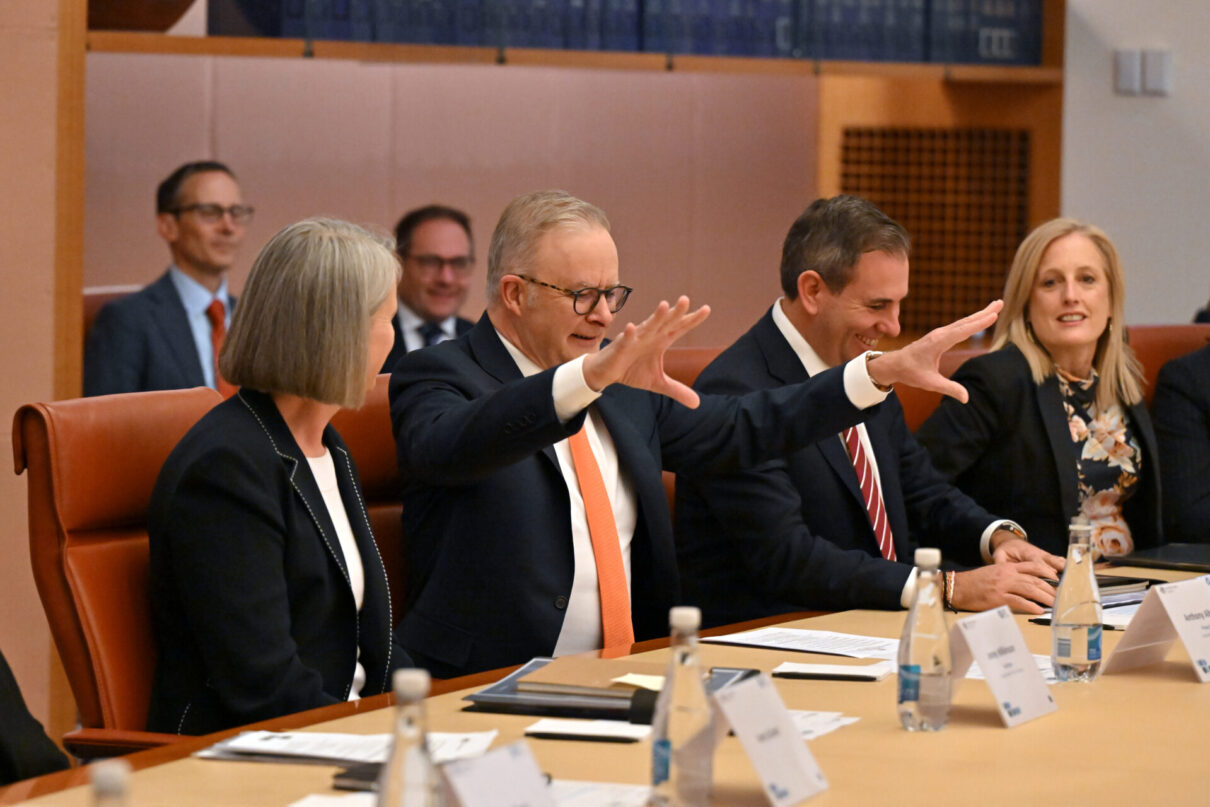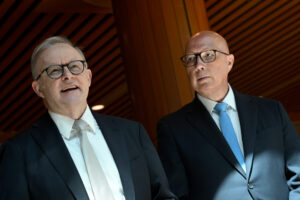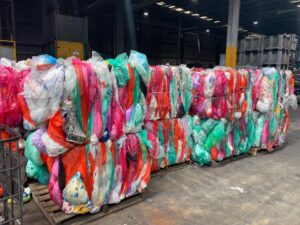A genuine debate about how to boost Australia’s productivity should bring in a wide range of groups to talk about a wide range of options, but, alas, that’s not what happened in Canberra last week.
The Albanese government’s Economic Reform Roundtable has far more to do with political power than how best to boost the rate of production at Australia’s factories or mines. The agenda was far narrower than the breadth of problems facing Australia and the attendees. With a few notable exceptions, those assembled were more likely to demand more tax cuts and more cuts to government spending than to question why decades of doing precisely that has delivered not just record low productivity growth but also record low quality in our essential services.
One of the core beliefs that unites Australian chief executives, the Department of the Treasury, the Productivity Commission and most of the Australian media is that the less tax a country collects and the less money it spends on essential services, the better its economy will perform. If only there was some data to back up their strong feelings.
According to the pinko lefties at the International Monetary Fund (IMF), the World Bank and the OECD – now headed by that well-known progressive Mathias Cormann – Australia is already one of the lowest taxed countries in the developed world and has one of the smallest public sectors. Yet despite decades of taking the advice of organisations such as the Productivity Commission and Treasury, resulting in decades of deregulation, privatisation and tax cuts, Australia has witnessed a collapse in productivity growth.
It’s just not polite to suggest that the people coming to the round table to fix our productivity problems might have been responsible for causing them. But chief executives are still expecting Australians to believe that the benefits of cutting the company tax rate will trickle down to the rest of us. And Danielle Wood, the head of the Productivity Commission, maintains that a bit more cutting of government spending and a bit more relying on free markets should do the trick.
Leaving aside the evidence of how a nice big dose of neoliberalism has “fixed” Australia over the past few decades, international examples are even more stark. The OECD, World Bank and IMF all show that the highest-tax countries in the world are among the most productive as well.
In Sweden, government spending accounts for 50.43 per cent of GDP or, put another way, government employees produce more than half of all the goods and services made in Sweden each year. Where Australians rely heavily on private cars, private schools, private health insurance, Swedes rely on public services to meet those same needs. And over the past 25 years, productivity growth in Sweden’s private sector has been more than double that in Australia. Moreover, Swedes’ kids do better at school and they report feeling happier.
Sweden is no outlier. Norway, Denmark and Finland all have much higher taxes and much bigger public sectors than ours, and much stronger productivity growth.
In all the talk this week about the need to cut taxes, and on how spending on the “care sector” is dragging Australia down, little was said about how countries with higher taxes and bigger care sectors than ours are kicking our butts in the productivity stakes.
In a democracy, power is the ability to talk bullshit and get away with it, and this week a lot of power spoke a lot of bullshit.
Luckily, some of it was called out. While the gas industry remains determined to keep getting most of its gas for free, ACTU president Sally McManus called for a raft of new tax measures that would boost government revenue, reduce inequality and drive productivity growth. The ACTU wants big cuts to the mining industry’s diesel fuel subsidies – to encourage energy efficiency and save billions of dollars a year – and a 25 per cent tax on all gas exports. Rather than giving half of our gas away free, the ACTU’s proposal would see more provided to Australian industry, at lower prices, while raising more than $10 billion a year in extra revenue.
As Nobel Prize-winning economist Joseph Stiglitz said on his last trip to Australia, taxing the gas industry is a “no-brainer”. But the reality is many of those tasked with economic reform in Australia would rather punch down than up. Unemployment benefits that are below the poverty line are apparently fine, and it’s perfectly acceptable to call for cuts to disability services, but in Australia, especially at events such as a productivity round table, it’s considered quite rude to suggest it’s time for the gas industry to stop free riding.
To be clear, while free riding can be very profitable, the things that maximise the profits of a company are usually quite different from the things that maximise the productivity of a company. While chief executives like to talk about the latter, all their shareholders care about is the former, so when there is a choice between the two, it’s no surprise that the bosses will chase profits.
Take wage theft. Productivity growth means a company can produce the same amount of goods or services with fewer staff; wage theft means a firm can produce the same amount of goods and services with a lower wage bill. For a chief executive, both productivity growth and wage theft are potential paths to higher profits, but for the nation as a whole these paths aren’t equal.
That is why the Productivity Commission’s support for AI companies to get free access to authors’ intellectual property is so bizarre.
The commission is a taxpayer-funded think tank that promotes small government. To say it is beset by internal contradictions is an understatement. Even so, their proposal that Australian writers should be required to donate their private property to some of the world’s richest companies in order to help train AI algorithms was a jaw-dropper. Forcing artists to give their intellectual property for free would reduce productivity.
Just as abolishing slavery and unpaid overtime forces firms to think harder about how to use labour more efficiently, forcing AI companies to pay for the texts they are using to train their algorithms would force the tech giants to think harder about what garbage the algorithms are being fed. Children don’t get smart by reading nonsense on the internet; nor does ChatGPT. Making all knowledge freely available to AI algorithms creates no incentive for someone to develop algorithms that are only fed on reputable texts. Put simply, forcing AI companies to pay for high-quality data would force them to use data more productively.
We can hardly blame chief executives whose multimillion-dollar bonuses are linked to the dividends they generate for their shareholders for arguing that cutting the company tax rate, or their workers’ pay, would be a great way to boost productivity. But we can blame governments who fall for such attempts to dress up the self-interest of the most fortunate as being in the national interest.
Some have mocked the idea that a productivity round table might be little more than a talk fest, but such criticism is not well meaning. Australians need to talk a lot more about what productivity is, where it comes from and what we should do to get more of it.
Sweden does exist. Norway does exist. Without either a Productivity Commission or its neoliberal agenda, the Nordic countries have managed to drive much stronger productivity growth than Australia. Those countries have also delivered stronger wage growth and better quality of life, and managed to tax their fossil fuel industries without their lights going out.
The first term of the Albanese government will not go down as one of the bravest or most innovative. But to their credit, they changed their mind on the stage three tax cuts and have shifted $80 billion from the highest income earners to the bottom and middle. And to the credit of voters, Labor were clearly rewarded for doing so. If the round table is seen as the beginning of a new conversation about how to tax and spend better, rather than merely the continuation of the old conversation about how tax cuts for the rich will help the poor, then Australia might get back on track.
Between the Lines Newsletter
The biggest stories and the best analysis from the team at the Australia Institute, delivered to your inbox every fortnight.
You might also like
5 ways and 63 billion reasons to improve Australia’s tax system
With a federal election just around the corner, new analysis from The Australia Institute reveals 63 billion reasons why our next Parliament should improve the nation’s tax system.
Soft plastic recycling is back in supermarkets!
For many of us, the end of June will mark the return of soft plastic recycling run by the Soft Plastics Taskforce (SPT), which is made up of the three major supermarkets: Woolworths Group, Coles Group and ALDI. But this may be premature since the joint recycling strategy from the Ministry of the Environment and
Why a fossil fuel-free COP could put Australia’s bid over the edge
When the medical world hosts a conference on quitting smoking, they don’t invite Phillip Morris, or British American Tobacco along to help “be part of the solution”.




